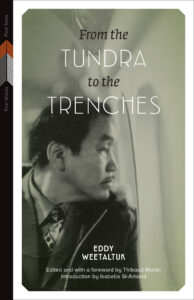
Eddie Weetaltuk
Eddy Weetaltuk was born in 1932 on Strutton Island in James Bay, Nunavut. In 1941, the Canadian federal government assigned every Inuk a number which served as their name. These were known as ‘Eskimo’ disk numbers and consisted of a stamped disk or card that Inuk people had to carry at all times. Eddy’s number was E9-422; E for Eskimo, 9 for his community and the number 422 to identify him as an individual. The practice of ‘Eskimo’ stemmed from the inability of government officials and missionaries to pronounce, spell and understand the significance of Inuit names. ‘Weetaltuk’ means ‘innocent eyes’ in Inuktitut.
Eddy was born into a family of Arctic whale hunters, Weetaltuk’s early life was marked by poverty and hardship. He was one of twelve siblings, and his upbringing was defined by the challenges of living in an environment where resources were scarce, and famine was a haunting reality.
In his pursuit of adventure and a desire to escape the confines of his upbringing, Weetaltuk embarked on a journey that would lead him to unexpected places. He briefly attended the Roman Catholic residential school, Sainte-Thérèse-de-l’Enfant-Jésus, where the echoes of assimilation efforts were felt. Believing that Inuits were not allowed to leave the north (due to the ‘Eskimo’ disk system), Eddy sought a new identity, he took on the name Eddy Vital and found work as a logger in the town of Fort-Coulonge in western Québec.
In 1951, Eddy enlisted in the Canadian army under the assumed name Edward Vital. When he enlisted in the army, he was given a new number, SC-17515, Weetaltuk became the first Canadian Inuit soldier to serve in the Korean War.
Weetaltuk’s involvement in the Korean War was a defining chapter in his life. As a member of the 2nd Battalion, Princess Patricia’s Canadian Light Infantry, he was deployed to a distant and foreign land, thrust into the harsh realities of war. Eddy spent 15 years in the Canadian army, serving in Korean, Japan and Germany.
In 1967, he returned home to Nunavut and decided to share his extraordinary journey. In 1974 he began collaborating with sociologist Thibault Martin to shape his autobiography, capturing his transformation from a young Inuk boy to a soldier who had seen the world.
In his later years, Weetaltuk’s focus shifted towards helping the younger generation of Inuit overcome the challenges of drug and alcohol addiction. Settling in Kuujjuarapik, Nunavik, he aimed to be a beacon of inspiration, using his own experiences to guide others towards a brighter future.
Eddy passed away suddenly in 2005 just days before the final version of his book was completed. His wish for his story was to empower young Inuit individuals to find strength in their culture and heritage. His autobiography, later translated into multiple languages, including English as “From the Tundra to the Trenches,” published in 2017, became a testament to his journey and a source of inspiration for generations to come.
Sources :
Feature: From the Tundra to the Korean War: Eddy Weetaltuk’s story. Nunatsiaq News. (2009, July 17). https://nunatsiaq.com/stories/article/feature_from_the_tundra_to_the_korean_war_eddy_weetaltuks_story/
Goodreads. (2017, February 3). From the Tundra to the trenches (first voices, first te… Goodreads. https://www.goodreads.com/book/show/29993297-from-the-tundra-to-the-trenches
Melgaard, M. (2017, February 28). “a gripping first-hand account”: The memoir of an Inuit veteran of the … National Post. https://nationalpost.com/entertainment/books/book-reviews/a-gripping-first-hand-account-the-memoir-of-an-inuit-veteran-of-the-korean-war-is-published-after-waiting-decades
WEETALTUK, E. (2019). From the Tundra to the Trenches. UNIV OF MANITOBA PRESS.
Weetaltuk, Eddy. Inuit Literatures ᐃᓄᐃᑦ ᐊᓪᓚᒍᓯᖏᑦ Littératures inuites. (n.d.). https://inuit.uqam.ca/en/person/weetaltuk-eddy
Korean War - Key Events
January 4, 1951
Chinese and North Korean forces recapture Seoul.
These events are taken from the Encyclopedia Britannica

Comments
Likes 1
You must be a registered user to comment or like - please register to join us!